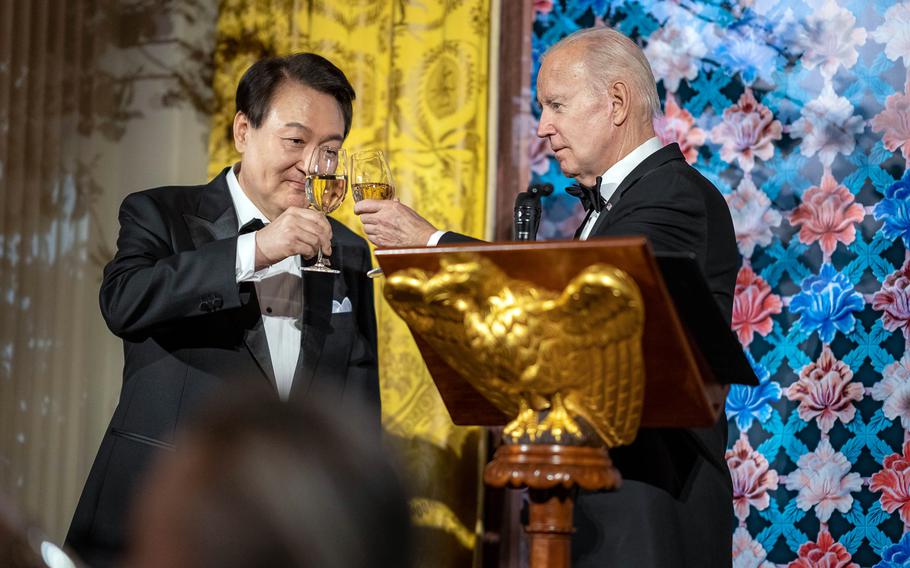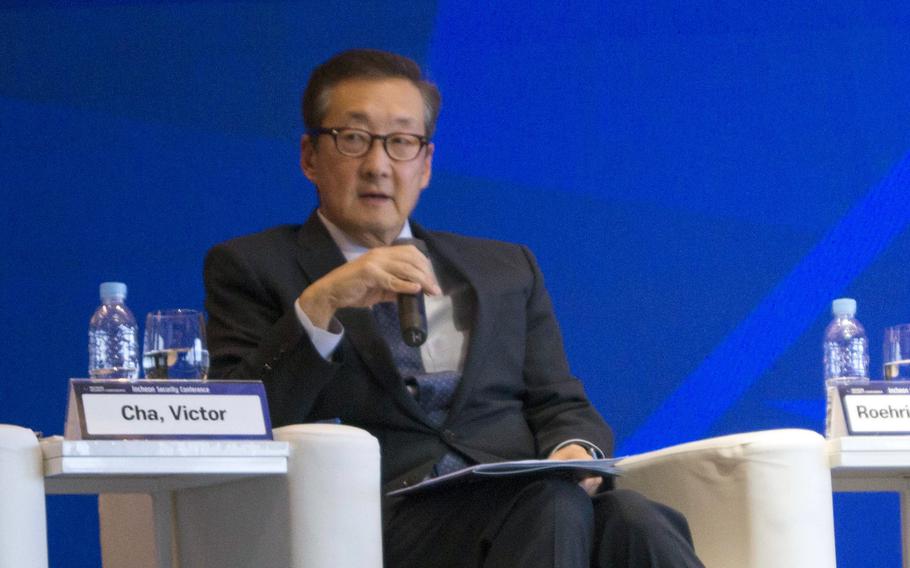
President Joe Biden and South Korean President Yoon Suk Yeol make a toast during at the White House, April 26, 2023. (Adam Schultz/The White House)
INCHEON, South Korea — The United States’ connection to South Korea is the “best that it’s ever been” and has led to a strengthened relationship between Seoul and Tokyo, according to a Georgetown University professor.
Following President Joe Biden’s two summits this year with South Korean President Yoon Suk Yeol, the alliance between Washington and Seoul is “humming on all cylinders,” government professor Victor Cha said Monday at the Incheon Security Conference hosted by Kyonggi University’s Graduate School of Political Studies.
The two leaders’ meetings in April and August resulted in several military and trade agreements, including regular visits of U.S. military’s “strategic assets” to South Korea — such as the ballistic missile submarine USS Kentucky’s visit to Busan in July — and new, favorable U.S. guidance on tax credits for South Korean electric vehicles.
But the agreements have left open several questions, such as whether South Korea should obtain nuclear weapons to deter the North and allegations from South Korean lawmakers that the trade agreements unfairly benefit Washington.
Cha, who in 2004 served as the National Security Council’s director for Asian affairs, argued that despite those concerns, “the most important thing is the mindset of the two leaders and the overall direction — it’s really quite excellent right now.”
The U.S. and South Korea this year initiated a higher tempo of military exercises, including Ulchi Freedom Shield in August, a twice-yearly, large-scale series of field exercises that test the allies’ military capabilities against the North.
One of the most important developments of the U.S.-South Korea alliance within the past year is the “vast improvement” of the three-way relationship with Japan, Cha said.

Georgetown University professor Victor Cha discusses the U.S.-Japan alliance during the Incheon Security Conference in Icheon, South Korea, Sept. 18, 2023. (Christopher Green/Stars and Stripes)
Relations between South Korea and Japan have long been frayed by historical disagreements and trade disputes, which culminated in Seoul warning it may end its military intelligence-sharing agreement with Tokyo in 2020.
South Korea’s stance toward Japan changed after Yoon took office in 2022. He pledged to thaw relations with his country’s eastern neighbor and met Aug. 18 with Prime Minister Fumio Kishida at a summit hosted by Biden at Camp David in Maryland.
The three leaders agreed to “inaugurate a new era of trilateral partnership” to counter military threats from North Korea and “aggressive behavior” from China in the South China Sea, according to a joint statement at the time.
“As we embark together in this new era, our shared values will be our guide and a free and open Indo-Pacific, in which our half-billion people are safe and prosperous, will be our collective purpose,” the statement said.
Japan’s Maritime Self-Defense Force joined warships from the U.S. and South Korea in several military drills this year, including a ballistic missile defense exercise on Aug. 29 near Jeju Island, south of the Korean Peninsula.
The U.S., South Korea and Japan’s “institutionalization in the broader scope of cooperation really is unprecedented,” Cha said.
“It is transforming the U.S.-[South Korea] and U.S.-Japan alliances from being more than just private goods that provide exclusive benefits to allied partners, to also publicly benefit the world,” Cha added.